Victoire ! Mamadou Bah obtient le statut réfugié
3 juin par Denis Desbonnet
 Toutefois, si contre toute attente, une décision négative, ou du moins ne nous donnant pas satisfaction (telle une « protection subsidiaire », ne lui offrant qu’un statut et un immunité au rabais et provisoire), devait être prise par le CGRA, il faudrait alors relancer la mobilisation politique et citoyenne pour appuyer les recours indispensables. Et d’abord sur le plan financier, le nerf de cette « guerre d’usure » : jusqu’à présent, son avocat a généreusement accepté de travailler gratis, même pas "pro deo", gardant cette possibilité pour ces éventuels recours, autrement coûteux que la phase actuelle de la procédure.
Toutefois, si contre toute attente, une décision négative, ou du moins ne nous donnant pas satisfaction (telle une « protection subsidiaire », ne lui offrant qu’un statut et un immunité au rabais et provisoire), devait être prise par le CGRA, il faudrait alors relancer la mobilisation politique et citoyenne pour appuyer les recours indispensables. Et d’abord sur le plan financier, le nerf de cette « guerre d’usure » : jusqu’à présent, son avocat a généreusement accepté de travailler gratis, même pas "pro deo", gardant cette possibilité pour ces éventuels recours, autrement coûteux que la phase actuelle de la procédure.


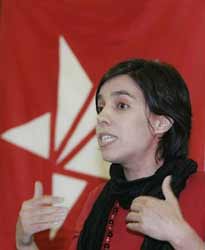 The regime is collapsing, it is dying and in its last-ditch struggle to survive, the king has abdicated. Never has the regime resulting from the Transition
The regime is collapsing, it is dying and in its last-ditch struggle to survive, the king has abdicated. Never has the regime resulting from the Transition 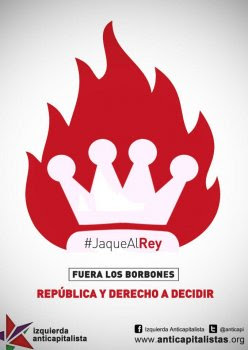 Se va el Rey Juan Carlos. El régimen del 78, el régimen de la monarquía corrupta trata de reciclarse, de colocar en la cabeza del Estado a un rey más joven, con menos lastre, pero que representa lo mismo: al régimen de la corrupción, de la miseria, de la falta de democracia.
Se va el Rey Juan Carlos. El régimen del 78, el régimen de la monarquía corrupta trata de reciclarse, de colocar en la cabeza del Estado a un rey más joven, con menos lastre, pero que representa lo mismo: al régimen de la corrupción, de la miseria, de la falta de democracia.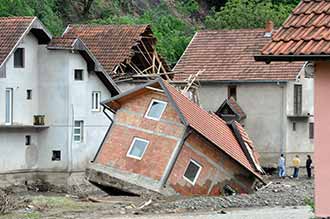 Since May 17, floods in the Balkans have taken a heavy toll with 17 deaths in Serbia, 27 in Bosnia and 2 in Croatia. Add to this disaster tens of thousands of displaced people and of homes without electricity, and enormous material damage. According to the political authorities, flooding on this scale has not been seen in the region for over a century. 40% of Bosnian territory has been devastated by floods. Damage is estimated at around 1.3 billion euros, the equivalent of 10% of the country’s GDP.
Since May 17, floods in the Balkans have taken a heavy toll with 17 deaths in Serbia, 27 in Bosnia and 2 in Croatia. Add to this disaster tens of thousands of displaced people and of homes without electricity, and enormous material damage. According to the political authorities, flooding on this scale has not been seen in the region for over a century. 40% of Bosnian territory has been devastated by floods. Damage is estimated at around 1.3 billion euros, the equivalent of 10% of the country’s GDP. Christine Daure-Serfaty est décédée à Paris, mercredi matin 28 mai dans sa quatre-vingt-huitième année. C'est une grande dame qui s'en va, une Juste qui avait fait de la résistance une évidence, vitalité essentielle en tout lieu et en toute époque. Pour le peuple marocain, dont elle avait épousé le destin, elle restera comme l'une des héroïnes de son inlassable combat pour les droits humains.
Christine Daure-Serfaty est décédée à Paris, mercredi matin 28 mai dans sa quatre-vingt-huitième année. C'est une grande dame qui s'en va, une Juste qui avait fait de la résistance une évidence, vitalité essentielle en tout lieu et en toute époque. Pour le peuple marocain, dont elle avait épousé le destin, elle restera comme l'une des héroïnes de son inlassable combat pour les droits humains.  C'est une véritable secousse historique pour l'Europe et un énorme coup de tonnerre en France avec la victoire du Front national. Les résultats des élections européennes confirment la crise politique terrible qui frappe l'Europe. Il y a une onde de choc dont on ne peut encore mesurer tous les effets politiques. Bien sûr, il faut se garder d'une lecture française des résultats électoraux européens qui concernent 28 Etats : selon la situation politique de chaque pays, les rapports de forces peuvent varier, ici et là, mais de grandes tendances se dégagent néanmoins sur fond de crise et de dégradation de rapports de forces pour le mouvement ouvrier : abstention massive, poussée de l'extrême droite, recul de la droite traditionnelle, affaiblissement considérable de la social-démocratie, maintien de la gauche radicale avec une poussée de Syriza en Grèce et de Podemos en Espagne.
C'est une véritable secousse historique pour l'Europe et un énorme coup de tonnerre en France avec la victoire du Front national. Les résultats des élections européennes confirment la crise politique terrible qui frappe l'Europe. Il y a une onde de choc dont on ne peut encore mesurer tous les effets politiques. Bien sûr, il faut se garder d'une lecture française des résultats électoraux européens qui concernent 28 Etats : selon la situation politique de chaque pays, les rapports de forces peuvent varier, ici et là, mais de grandes tendances se dégagent néanmoins sur fond de crise et de dégradation de rapports de forces pour le mouvement ouvrier : abstention massive, poussée de l'extrême droite, recul de la droite traditionnelle, affaiblissement considérable de la social-démocratie, maintien de la gauche radicale avec une poussée de Syriza en Grèce et de Podemos en Espagne.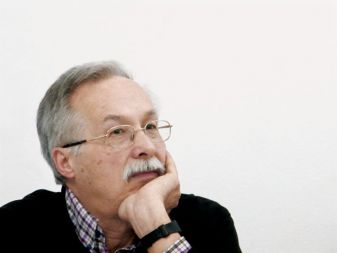 En dépit du fait que la participation s'est élevée à seulement 45,85%, les élections au Parlement européen se sont converties en premier test de l'évolution de la situation politique et sociale espagnole depuis que le Parti populaire (PP) a accédé au gouvernement [fin 2011]. Pour cette raison, bien qu'elles ne soient pas extrapolables à des élections générales
En dépit du fait que la participation s'est élevée à seulement 45,85%, les élections au Parlement européen se sont converties en premier test de l'évolution de la situation politique et sociale espagnole depuis que le Parti populaire (PP) a accédé au gouvernement [fin 2011]. Pour cette raison, bien qu'elles ne soient pas extrapolables à des élections générales 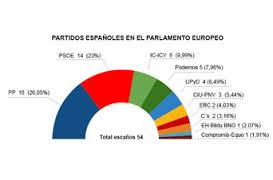 Han pasado ya casi seis años casi desde el inicio "oficial" de la crisis con la quiebra de Lehman Brothers en septiembre de 2008. Cuatro desde el anuncio del primer gran paquete de recortes en mayo de 2010 por parte de Zapatero. Tres desde el estallido del 15M. Dos desde la gran manifestación independentista en Catalunya el 11S de 2012.
Han pasado ya casi seis años casi desde el inicio "oficial" de la crisis con la quiebra de Lehman Brothers en septiembre de 2008. Cuatro desde el anuncio del primer gran paquete de recortes en mayo de 2010 por parte de Zapatero. Tres desde el estallido del 15M. Dos desde la gran manifestación independentista en Catalunya el 11S de 2012.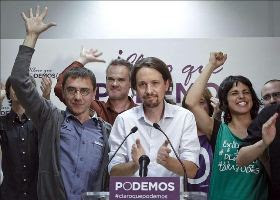 La diferencia entre el Frente Nacional y Podemos es el 15M. Y, por extensión, entre el ascenso de la barbarie xenófoba en casi toda Europa y la excepción parcial que afortunadamente tenemos por estos lares. "Parcial" porque el PP no tiene mucho que envidiarle al populismo xenófobo, machista, nacionalista y meapilas de la nueva derecha extrema ascendente europea. Pero excepción más que bienvenida, al fin y al cabo.
La diferencia entre el Frente Nacional y Podemos es el 15M. Y, por extensión, entre el ascenso de la barbarie xenófoba en casi toda Europa y la excepción parcial que afortunadamente tenemos por estos lares. "Parcial" porque el PP no tiene mucho que envidiarle al populismo xenófobo, machista, nacionalista y meapilas de la nueva derecha extrema ascendente europea. Pero excepción más que bienvenida, al fin y al cabo. La larga onda del 15M ha entrado en su ciclo político. Hasta ahora las grandes sacudidas de la indignación habían sido esencialmente sociales: las calles, las Mareas o las grandes marchas por la Dignidad. Después de la jornada de ayer se puede afirmar con rotundidad que la indignación se ha empezado a transformar en respuesta política. La aparición de Podemos con 1.250.000 votos y la crisis de los dos partidos del sistema son los grandes hechos de las elecciones del 25 de Mayo.
La larga onda del 15M ha entrado en su ciclo político. Hasta ahora las grandes sacudidas de la indignación habían sido esencialmente sociales: las calles, las Mareas o las grandes marchas por la Dignidad. Después de la jornada de ayer se puede afirmar con rotundidad que la indignación se ha empezado a transformar en respuesta política. La aparición de Podemos con 1.250.000 votos y la crisis de los dos partidos del sistema son los grandes hechos de las elecciones del 25 de Mayo. Green Left Weekly’s Peter Boyle spoke to Kevin Lin, who is doing research for his PhD at the University of Technology Sydney on the labour movement in China, about the background to a new wave of strikes in the country.
Green Left Weekly’s Peter Boyle spoke to Kevin Lin, who is doing research for his PhD at the University of Technology Sydney on the labour movement in China, about the background to a new wave of strikes in the country.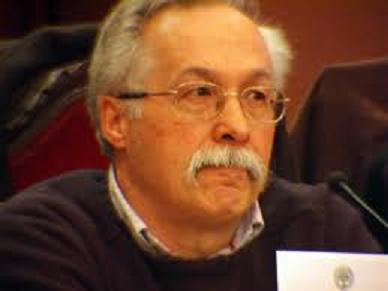 As we celebrate the third anniversary of 15M in different forums of reflection it has been possible to remember the events that gave rise to a new cycle of protests and with them to an "expansion of the field of the possible", recreating a broad and plural public space for political action other than the institutional sort. Thus was generated a broad relation of initiatives, arising in an increasing symbiosis between social networks, the plazas and the streets of so many places, with greater or lesser fortune, but all of them bringing to light the fact that something was changing in the landscape and the political climate, in contrast to the Newspeak of a regime bent on continuing installing in the minds of people the culture of cynicism, fear and resignation.
As we celebrate the third anniversary of 15M in different forums of reflection it has been possible to remember the events that gave rise to a new cycle of protests and with them to an "expansion of the field of the possible", recreating a broad and plural public space for political action other than the institutional sort. Thus was generated a broad relation of initiatives, arising in an increasing symbiosis between social networks, the plazas and the streets of so many places, with greater or lesser fortune, but all of them bringing to light the fact that something was changing in the landscape and the political climate, in contrast to the Newspeak of a regime bent on continuing installing in the minds of people the culture of cynicism, fear and resignation.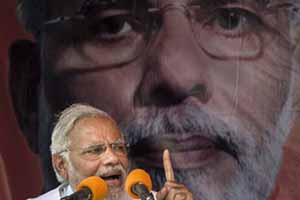 Narendra Modi and the BJP bludgeoned their way to election victory The sheer aggression of the BJP campaign, the threats to the Election Commission – Modi made sure India felt his presence.
Narendra Modi and the BJP bludgeoned their way to election victory The sheer aggression of the BJP campaign, the threats to the Election Commission – Modi made sure India felt his presence.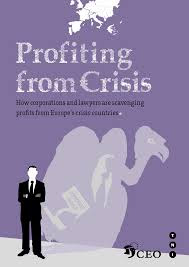 What do international arbitration institutions have in common with Domino’s Pizza, public transport operators, pawnbrokers, discount supermarkets, property auctioneers, and opposition politicians? Answer: all have profited from the global economic downturn.
What do international arbitration institutions have in common with Domino’s Pizza, public transport operators, pawnbrokers, discount supermarkets, property auctioneers, and opposition politicians? Answer: all have profited from the global economic downturn. 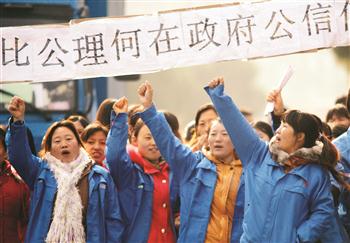 ANN ARBOR—Income inequality has been rising rapidly in China and now surpasses that of the U.S. by a large margin, University of Michigan researchers say.
ANN ARBOR—Income inequality has been rising rapidly in China and now surpasses that of the U.S. by a large margin, University of Michigan researchers say.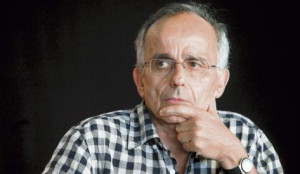 À une poignée de semaines des élections européennes, L’Humanité publie une double page de points de vue sur le Front de gauche [1]. Si l’on se fie à ces propos, l’espérance de vie dudit Front est bien courte.
À une poignée de semaines des élections européennes, L’Humanité publie une double page de points de vue sur le Front de gauche [1]. Si l’on se fie à ces propos, l’espérance de vie dudit Front est bien courte.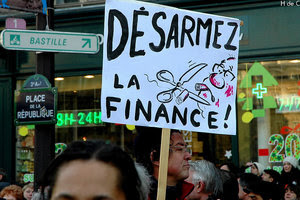 This text proposes a series of concrete alternatives to counter the current crisis shaking Europe. It presents nineteen immediate measures that should be taken vis-à-vis finance in general and the banking sector in particular. In addition to these measures, it proposes to socialise the banking and insurance sectors, and to place them under citizen control. It then examines ten measures to be taken to reverse the crisis in a way that will be favourable to the vast majority of people. 1. Stopping austerity plans; 2. Repudiating all illegitimate, unsustainable, odious, and illegal public debt; 3. Cancelling all illegitimate and illegal private debt; 4. Increasing the resources of public authorities; 5. Decreasing inequalities by establishing fiscal justice; 6. Setting up legitimate government borrowing; 7. Developing and extending public services; 8. Strengthening the pension system based on intergenerational solidarity; 9. Radically decreasing working hours to guarantee jobs for everyone, and adopting an income policy that will bring about social justice; 10. Questioning the basis of the euro and taking action to build a different Europe, which would mean replacing the current treaties based on a true democratic process involving all the peoples of Europe. These are the propositions the CADTM is putting forward for discussion and debate.
This text proposes a series of concrete alternatives to counter the current crisis shaking Europe. It presents nineteen immediate measures that should be taken vis-à-vis finance in general and the banking sector in particular. In addition to these measures, it proposes to socialise the banking and insurance sectors, and to place them under citizen control. It then examines ten measures to be taken to reverse the crisis in a way that will be favourable to the vast majority of people. 1. Stopping austerity plans; 2. Repudiating all illegitimate, unsustainable, odious, and illegal public debt; 3. Cancelling all illegitimate and illegal private debt; 4. Increasing the resources of public authorities; 5. Decreasing inequalities by establishing fiscal justice; 6. Setting up legitimate government borrowing; 7. Developing and extending public services; 8. Strengthening the pension system based on intergenerational solidarity; 9. Radically decreasing working hours to guarantee jobs for everyone, and adopting an income policy that will bring about social justice; 10. Questioning the basis of the euro and taking action to build a different Europe, which would mean replacing the current treaties based on a true democratic process involving all the peoples of Europe. These are the propositions the CADTM is putting forward for discussion and debate. On the eve of April 25, Portuguese society was smouldering from contradictions accumulated in half a century of dictatorship. At the heart of these contradictions was a war that lasted thirteen years, to hold on to the African colonies of Angola, Mozambique, Guinea, Cape Verde and Sao Tome and Principe. This conflict conditioned the whole of national life, because of the social suffering caused by the mobilization of two hundred thousand men, a tenth of the working population (a human cost equivalent to twice that of Vietnam), because of the wave of migration driven by hunger and the war, and because of the impossibility of a military solution, the only one contemplated by the regime.
On the eve of April 25, Portuguese society was smouldering from contradictions accumulated in half a century of dictatorship. At the heart of these contradictions was a war that lasted thirteen years, to hold on to the African colonies of Angola, Mozambique, Guinea, Cape Verde and Sao Tome and Principe. This conflict conditioned the whole of national life, because of the social suffering caused by the mobilization of two hundred thousand men, a tenth of the working population (a human cost equivalent to twice that of Vietnam), because of the wave of migration driven by hunger and the war, and because of the impossibility of a military solution, the only one contemplated by the regime. Le scrutin législatif en cours revêt une importance toute particulière pour l’Inde, le favori des sondages promouvant un nationalisme agressif d’extrême droite, racial et religieux.
Le scrutin législatif en cours revêt une importance toute particulière pour l’Inde, le favori des sondages promouvant un nationalisme agressif d’extrême droite, racial et religieux.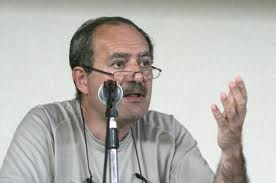 1) The last municipal elections represent a new worsening of the political balance of forces for the left and the labour movement. 150 cities of more than 10,000 inhabitants swung from SP or CP-led to the right or far right.
1) The last municipal elections represent a new worsening of the political balance of forces for the left and the labour movement. 150 cities of more than 10,000 inhabitants swung from SP or CP-led to the right or far right.